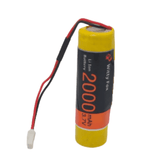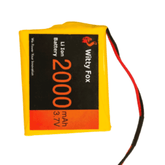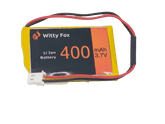Lithium-Ion Batteries for Electric Vehicles
Summary
Explore the Power Behind Electric Mobility with Lithium-Ion Batteries for Electric Vehicles! Uncover the fascinating world of electric vehicle batteries, delving into the science of how they work. Discover the numerous advantages of lithium-ion batteries in electric vehicles, from efficiency to longevity. Whether you're a tech enthusiast or a green energy advocate, this blog is your ticket to understanding the driving force behind the EV revolution. Get charged up with the future of transportation! Read on to find out more about the electrifying world of lithium-ion batteries in electric vehicles
Lithium-Ion Batteries for Electric Vehicles
Lithium-ion batteries have become the go-to power source for electric vehicles. They provide several advantages over traditional lead acid and nickel metal hydride options. Their higher energy density allows them to hold a larger charge meaning they can travel further between charges, increasing their efficiency and range per cost of ownership.

The battery chemistry also ensures that lithium ion cells discharge quickly, making it easier to get from A to B quickly as well as providing rapid acceleration when needed. As an added bonus they are also lighter than other types of batteries giving EV’s a greater empirical advantage in terms of both performance and economy expectations associated with modern vehicular transportation requirements such as achieving highway speeds within minutes once powered up!
Additionally Lithium Ion technology has proven itself reliable over time; offering safer, more dependable operation while sustaining its original capacity despite long term use cycles – thereby indicating good levels of longevity even under heavy loads or rough terrain conditions. In conclusion Electric Vehicle Battery makers must take into account all these positive traits associated with this type of chemical implementation if seeking true efficiency excellence on the market today!
read more : All About Lithium Polymer Batteries (LiPo)
What are electric vehicle batteries and how do they work?
Electric vehicle batteries are an essential component of modern transportation. They provide the power necessary to propel electric vehicles forward and enable them to reach their destination reliably, safely, and quickly.
An EV battery is a rechargeable energy storage unit made up of one or more cells connected in series with each other, usually arranged into modules that can store electrical charge for long periods without any maintenance requirements from its user.

These batteries work by creating chemical reactions between two materials within the cell – either lithium-ion or nickel metal hydrate – which produces electricity when discharged through the motor; this process also recharges itself as soon as it reaches full capacity again using regenerative braking systems on most EVs today.
Being able to simply plug your car into a charging station rather than wasting time filling up gas tanks at service stations makes these types of powering units incredibly valuable investments if you want to save money while still providing reliable trips throughout town!
read more : What is AH in Battery
How do electric car batteries work?
Electric cars have revolutionized the way we think about transportation. They're powered by lithium-ion batteries, which can be charged at home or in public charging stations for a more efficient journey without tailpipe emissions.
To understand how electric car batteries work, it's important to first look at their components and structure. Electric car batteries are composed of multiple cells connected together that contain an electrolyte solution - usually lithium ions dissolved within a solvent like carbon dioxide - along with electrodes called cathodes and anodes made from metals such as cobalt oxide or nickel manganese cobalt (NMC).

When the battery is being used, electrons move between these two points due to electrochemical reactions caused by the salts in the electrolytes solution; this conversion produces energy stored inside them that drives electric motors forward when released through transmission systems. This process can then recharge itself once depleted power has been restored via plugging into AC grid outlets or regenerative braking – making it incredibly useful for powering sustainable journeys on land!
read more : Lithium-Ion vs Lithium Polymer Battery
What are the advantages of lithium-ion battery in EV?
- Lithium-ion batteries (Li-Ion) are increasingly used in electric vehicles (EVs). These batteries provide numerous advantages that make them a great option for powering EVs.
- One of the main benefits of Li-Ion is their light weight, which leads to much better fuel efficiency as well as cost savings over traditional lead acid battery systems.
- They also have improved efficiency compared with other types of EV batteries, allowing an extended range and faster charging times than most alternatives offer today’s drivers – this can be particularly important on longer journeys or when using public chargers where time spent plugged in must be kept to a minimum!

- The life cycle expectancy tends to significantly higher too meaning you will not have to replace your vehicle's battery pack nearly so often; making ownership more financially viable overall regardless the size & type of car chosen initially by its owner/driver(s).
- Their ability charge from empty relatively quickly makes them ideal candidates holding less energy until ‘topping up’ at stations enroute; in contrastlead acid requires full discharging before recharging again -an impractical choice if frequent top ups are required ion any journey
read more : Automatic Battery Charging Circuit
Also, read our blog on Li-po vs Li-ion Battery detailing comparison based on their specification, advantages, and disadvantages.
Conclusion:
The world of electric vehicles is rapidly evolving, and at the heart of this transformation are lithium-ion batteries. These powerhouses have revolutionized the way we drive, offering eco-friendly solutions, extended ranges, and impressive acceleration. Understanding how these batteries work and their advantages in electric vehicles is crucial for anyone considering going electric. From their energy density to reduced maintenance costs, it's clear that lithium-ion batteries are the driving force behind the electric vehicle revolution. So, if you're looking to embrace a greener, more efficient future, the road ahead is undoubtedly paved with lithium-ion batteries. Don't miss your chance to be a part of this electrifying journey!
If you appreciate our work don't forget to share this post and leave your opinion in the comment box.
Please do check out other blog posts about Popular electronics
Make sure you check out our wide range of products and collections (we offer some exciting deals!)














